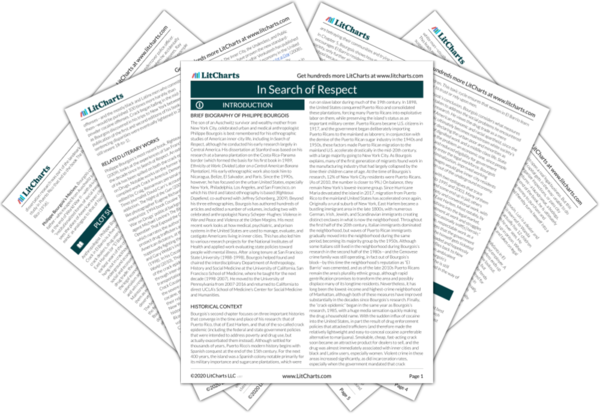The term “jíbaro” shows how generations of Puerto Ricans have had to reform their identities, concepts of pride, in response to the changing economic and political conditions that have forced them from one form of work and lifestyle to another. These continuous transformations and pressures, according to Bourgois, are one of the greatest obstacles to El Barrio residents’ chances at upward mobility and success in the legal economy.
A cultural trope that has become a basis of Nuyorican identity, the word “jíbaro” originally referred to rural Puerto Ricans who refused to work on colonial Spanish plantations and therefore “lived outside the jurisdiction of the urban-based state.” When Puerto Rico later became an American colony, the United States took farmers’ land and redistributed it to large corporations, and the term “jíbaro” came to refer precisely to those who did work on plantations for wages. Then, Bourgois explains, a generation of Puerto Ricans migrated to the urban United States, and for them “jíbaro” became a “symbol of Puerto Rican cultural integrity and self-respect.” Primo, for instance, repeatedly insists that he, his family, and his friends are “jíbaros.”
Throughout its history, however, “jíbaro” is also a derogatory term denoting supposedly uneducated, backward, working-class, rural Puerto Ricans. It connotes economic informality and resistance to the state, which makes it a salient way for those who participate in street culture and the underground economy to identify themselves and draw connections to their parents’ and grandparents’ lives in Puerto Rico, but also a way for those in the dominant culture to stereotype and dismiss El Barrio residents as incapable of assimilating to mainstream society.
However, the “jíbaro” concept also shows how differing notions of cultural capital allow those at the bottom to valorize the same characteristics that those at the top decry—jíbaro values emphasize the same kind of entrepreneurship, individual achievement, personal responsibility, machismo, unflappable pride, and patriarchal family structure that are deeply embedded in mainstream society, which is why Bourgois argues that the drug dealers (or underground entrepreneurs) he meets in East Harlem exemplify the American economic ethos, rather than contradicting it.
The jíbaro identity, however, meets significant resistance when Puerto Ricans move to New York City. For one, the old rural Puerto Rican emphasis on having as many children as possible—which becomes a source of paternal pride and gives families more agricultural workers—ultimately proves counterproductive in the urban environment of New York City, where children must be supported and sent to school. As a result, people like Ray take pride in fathering as many children as possible, but then refuse to support or see those children. In other words, he preserves the jíbaro gender ideology in a new situation where it is untenable. Similarly, the “jíbaro” emphasis on informal business dealings outside the sphere of the state, usually led by autonomous and self-reliant men who protect themselves and their families with force, is completely inadequate to the service-based, bureaucratic economy in which most second-generation Nuyoricans find themselves. Although Primo and Caesar’s fathers found stable work in the manufacturing sector, when they come of age, New York is dominated by service jobs in what Bourgois calls the “FIRE Sector” (Finance, Insurance, and Real Estate). Similarly, although Ray runs an excellent crack business, he does not have the cultural capital necessary to deal with government bureaucracy, and so has no idea how to get a driver’s license or start the legal businesses he so desperately needs to launder his drug money.
Jíbaro Quotes in In Search of Respect
To summarize, New York-born Puerto Ricans are the descendants of an uprooted people in the midst of a marathon sprint through economic history. In diverse permutations, over the past two or three generations their parents and grandparents went: (1) from semisubsistence peasants on private hillside plots or local haciendas; (2) to agricultural laborers on foreign-owned, capital-intensive agro-export plantations; (3) to factory workers in export-platform shantytowns; (4) to sweatshop workers in ghetto tenements; (5) to service sector employees in high-rise inner-city housing projects; (6) to underground economy entrepreneurs on the street. Primo captured the pathos of these macrostructural dislocations when I asked him why he sometimes called himself a jíbaro:
Primo: My father was a factory worker. It says so on my birth certificate, but he came to New York as a sugarcane cutter. Shit! I don’t care; fuck it! I ’m just a jíbaro. I speak jíbaro Spanish. Hablo como jíbaro [I speak like a jíbaro].










